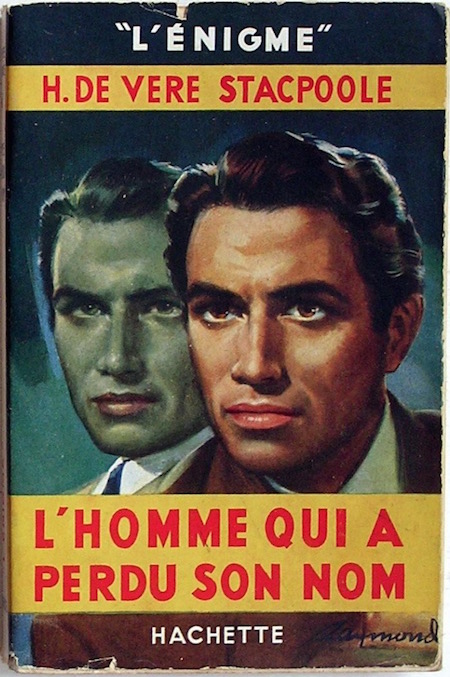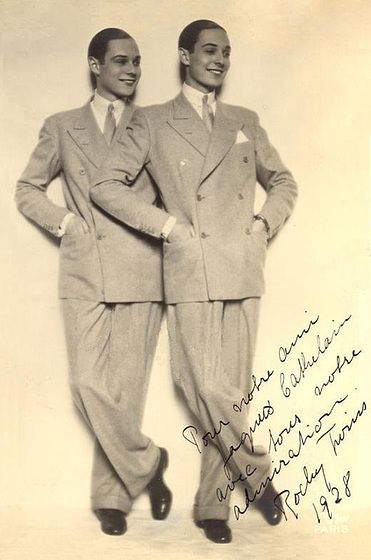THE MAN WHO LOST HIMSELF (2)
By:
January 29, 2018

This year marks the 100th anniversary of a forgotten Avenger/Artful Dodger-type adventure novel, The Man Who Lost Himself. A man down on his luck wakes up after a drunken night in London only to discover… that he has somehow slipped into the identity of a wealthy aristocrat! HiLoBooks is pleased to serialize this funny, thrilling yarn by H. De Vere Stacpoole — best known as author of The Blue Lagoon — here at HILOBROW.

The stranger, taking his change from the assistant bar tender, laughed.
“Yes,” said he, “you have seen me before, often, I should think. Do you mean to say you don’t know where?”
“Nope,” said Jones — he had acquired a few American idioms — “I’m clear out of my reckoning — are you an American?”
“No, I’m English,” replied the other. “This is very curious, you don’t recognise me, well — well — well — let’s sit down and have a talk, maybe recollection will come to you — give it time — it is easier to think sitting down than standing up.”
Now as Jones turned to take his seat at the table indicated by the stranger, he noticed that the bar keeper and his assistant were looking at him as though he had suddenly become an object of more than ordinary interest.
The subtlety of human facial expression stands unchallenged, and the faces of these persons conveyed the impression to Jones that the interest he had suddenly evoked in their minds had in it a link with the humorous.
When he looked again, however, having taken his seat, they were both washing glasses with the solemnity of undertakers.
“I thought those guys were laughing at me,” said Jones, “seems I was wrong, and all the better for them — well, now, let’s get to the bottom of this tangle — who are you, anyway?”
“Just a friend,” replied the other, “I’ll tell you my name presently, only I want you to think it out for yourself. Talk about yourself and then, maybe, you’ll arrive at it. Who are you?”
“Me,” cried Jones, “I’m Victor Jones of Philadelphia. I’m the partner of a skunk by name of Stringer. I’m the victim of a British government that doesn’t know the difference between tin plate and Harveyised steel. I’m a man on the rocks.”
The flood gates of his wrath were opened and everything came out, including the fact of his own desperate position.
When he had finished the only remark of the stranger was:
“Have another.”
“Not on your life,” cried Jones. “I ought to be making tracks for the consul or somewhere to get my passage back to the States — well — I don’t know. No — no more cocktails. I’ll have a sherry, same as you.”
The sherry having been despatched, the stranger rose, refusing a return drink just at that moment.
“Come into the lounge with me,” said he, “I want to tell you something I can’t tell you here.”
They passed up the stairs, the stranger leading the way, Jones following, slightly confused in his mind but full of warmth at his heart, and with a buoyancy of spirit beyond experience. Stringer was forgotten, the British Government was forgotten, contracts, hotel bills, steerage journeys to the States, all these were forgotten. The warmth, the sumptuous rooms, and the golden lamps of the Savoy were sufficient for the moment, and as he sank into an easy chair and lit a cigarette, even his interest in the stranger and what he had to say was for a moment dimmed and diminished by the fumes that filled his brain, and the ease that lapped his senses.
“What I have to say is this,” said the stranger, leaning forward in his chair. “When I saw you here some time ago, I recognised you at once as a person I knew, but, as you put it, I could not place you. But when I got into the main hall a mirror at once told me. You are, to put it frankly, my twin image.”
“I beg your pardon,” said Jones, the word image shattering his complacency. “Your twin which do you say?”
“Image, likeness, counterpart — I mean no offence — turn round and glance at that mirror behind you.”
Jones did, and saw the stranger, and the stranger was himself. Both men belonged to a fairly common type, but the likeness went far beyond that — they were identical. The same hair and colour of hair, the same features, shape of head, ears and colour of eyes, the same serious expression of countenance.
Absolute likeness between two human beings is almost as rare as absolute likeness between two pebbles on a beach, yet it occurs, as in the case of M. de Joinville and others well known and confirmed, and when I say absolute likeness, I mean likeness so complete that a close acquaintance cannot distinguish the difference between the duplicates. When nature does a trick like this, she does it thoroughly, for it has been noticed — but more especially in the case of twins — the likeness includes the voice, or at least its timbre, the thyroid cartilage and vocal chords following the mysterious law that rules the duplication.
Jones’ voice and the voice of the stranger might have been the same as far as pitch and timbre were concerned, the only difference was in the accent, and that was slight.
“Well, I’m d-d-d — ,” said Jones.
He turned to the other and then back to the mirror.
“Extraordinary, isn’t it?” said the other. “I don’t know whether I ought to apologise to you or you to me. My name is Rochester.”
Jones turned from the mirror, the two champagne cocktails, the whisky and the sherry were accommodating his unaccustomed brain to support this most unaccustomed situation. The thing seemed to him radiantly humorous, yet if he had known it there was very little humour in the matter.
“We must celebrate this,” said Jones, calling an attendant and giving him explicit orders as to the means.
SERIALIZED BY HILOBOOKS: Jack London’s The Scarlet Plague | Rudyard Kipling’s With the Night Mail (and “As Easy as A.B.C.”) | Arthur Conan Doyle’s The Poison Belt | H. Rider Haggard’s When the World Shook | Edward Shanks’ The People of the Ruins | William Hope Hodgson’s The Night Land | J.D. Beresford’s Goslings | E.V. Odle’s The Clockwork Man | Cicely Hamilton’s Theodore Savage | Muriel Jaeger’s The Man With Six Senses | Jack London’s “The Red One” | Philip Francis Nowlan’s Armageddon 2419 A.D. | Homer Eon Flint’s The Devolutionist | W.E.B. DuBois’s “The Comet” | Edgar Rice Burroughs’s The Moon Men | Charlotte Perkins Gilman’s Herland | Sax Rohmer’s “The Zayat Kiss” | Eimar O’Duffy’s King Goshawk and the Birds | Frances Hodgson Burnett’s The Lost Prince | Morley Roberts’s The Fugitives | Helen MacInnes’s The Unconquerable | Geoffrey Household’s Watcher in the Shadows | William Haggard’s The High Wire | Hammond Innes’s Air Bridge | James Branch Cabell’s Jurgen | John Buchan’s “No Man’s Land” | John Russell’s “The Fourth Man” | E.M. Forster’s “The Machine Stops” | John Buchan’s Huntingtower | Arthur Conan Doyle’s When the World Screamed | Victor Bridges’ A Rogue By Compulsion | Jack London’s The Iron Heel | H. De Vere Stacpoole’s The Man Who Lost Himself | P.G. Wodehouse’s Leave It to Psmith | Richard Connell’s “The Most Dangerous Game” | Houdini and Lovecraft’s “Imprisoned with the Pharaohs” | Arthur Conan Doyle’s “The Sussex Vampire.”
RADIUM AGE SCIENCE FICTION: “Radium Age” is HILOBROW’s name for the 1904–33 era, which saw the discovery of radioactivity, the revelation that matter itself is constantly in movement — a fitting metaphor for the first decades of the 20th century, during which old scientific, religious, political, and social certainties were shattered. This era also saw the publication of genre-shattering writing by Edgar Rice Burroughs, Sax Rohmer, E.E. “Doc” Smith, Jack London, Arthur Conan Doyle, Aldous Huxley, Olaf Stapledon, Karel Čapek, H.P. Lovecraft, Charlotte Perkins Gilman, Yevgeny Zamyatin, Philip Gordon Wylie, and other pioneers of post-Verne/Wells, pre-Golden Age “science fiction.” More info here.
READ GORGEOUS PAPERBACKS: HiLoBooks has reissued the following 10 obscure but amazing Radium Age science fiction novels in beautiful print editions: Jack London’s The Scarlet Plague, Rudyard Kipling’s With the Night Mail (and “As Easy as A.B.C.”), Arthur Conan Doyle’s The Poison Belt, H. Rider Haggard’s When the World Shook, Edward Shanks’ The People of the Ruins, William Hope Hodgson’s The Night Land, J.D. Beresford’s Goslings, E.V. Odle’s The Clockwork Man, Cicely Hamilton’s Theodore Savage, and Muriel Jaeger’s The Man with Six Senses. For more information, visit the HiLoBooks homepage.
